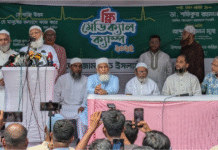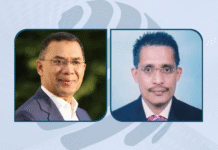
In This May 02 photo, Prime Minister Sheikh Hasina addresses a meeting at the Gono Bhaban in the capital.
Underling the importance of uninterrupted democracy for the continuation of ongoing development projects, Prime Minister Sheikh Hasina on Thursday said the present government has adopted the policy of ‘justice for peace’ to establish the ideals of secularism, democracy and progressivism.
“Uninterrupted democracy is a must to ensure overall development and continuation of ongoing development projects,” she said while addressing a function marking the celebration of 40 years of receiving the Juliot-Curie Peace Medal by Father of the Nation Bangabandhu Sheikh Mujibur Rahman.
World Peace Council organised the function at Osmani Memorial Auditorium.
The function, chaired by President of Bangladesh Peace Council Mozaffar Hossain Paltu, the function was addressed, among others, by Executive Secretary of the World Peace Council Iraklis Savdaridis, former Minister and Vice President of All India Peace and Solidarity Organisation Pramud Chandra Sinha, Member of Nepal Peace and Solidarity Council Gyanendra Bahadur Sreshtha.
Secretary of Bangladesh Peace Council Engineer MA Kashem delivered the welcome address.
The prime minister said the government is committed to establish peace and providing strong base to democracy by ensuring the trial of crimes and offences.
Hasina said the government has initiated the trials of war criminals and the International War Crimes Tribunals have started pronouncing the verdicts of these cases to ensure justice, which is one of the main prerequisites for peace.
She mentioned that her government is taking the country towards development facing various obstacles, including the destructive activities by the opposition parties and natural disasters.
In this connection, the prime minister mentioned the vandalism, including the burning the copies of Holy Quran and looting shops and making arson attacks on various establishments in the capital by Hefajat-e-Islam in connivance with the main opposition party.
About regional and global peace, the present government has adopted the policy of ‘justice for peace’ to establish ideals of secularism, democracy and progressivism following the ideals of Bangabandhu’s ‘Friendship towards all, malice towards none’ and ‘peaceful settlement of disputes.
Hasina said that her government is committed to the rule of law which helped reach peaceful settlements of disputes with neighbouring countries.
She mentioned the winning of Maritime Boundary case against Myanmar, and hoped that Bangladesh will get a solution to problems with India upholding the dignity of the country.
The prime minister also referred to the signing of Chittagong Hill Tracts (CHT) Peace Accord to restore peace in the region and the long-term Ganges Water Sharing Treaty with India during its previous term.
Paying rich tributes to Bangabandhu, the prime minister said he was the indomitable leader of world’s freedom-lovers, oppressed people and workers and struggled throughout the life for establishing peace, tranquility, friendship, freedom, and democracy.
The premier said the World Peace Council awarded Juliot-Curie Peace Prize to the Father of the Nation four decades ago as international recognition for his role in establishing peace across the world. “It was the first international honour that Bangladesh earned.”
Hasina recalled with deep gratitude the great contributions of the World Peace Council to the emergence of Bangladesh as an independent country. “The World Peace Council sided with Bangladesh wholeheartedly during the War of Liberation in 1971,” she t6old her audience.
Sheikh Hasina mentioned the presentation of her six-point peace model, ‘People’s Empowerment and Development’, in the UNGA in 2011 with a view to establishing world peace.
The model was unanimously passed by 193 members of the UN brightening Bangladesh’s image globally, she said.
Earlier, the prime minister distributed prizes among the winners of the child painting competition arranged on the occasion of the celebration of 40 years of winning the Juliot-Curie Peace Medal by the Father of the Nation.
Source: The Daily Star









